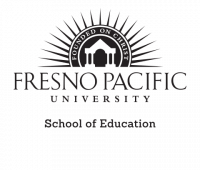A Fresno Pacific University faculty member put her literacy education to work in Albania.
Autumn Witt, Ph.D., associate professor of education, usually teaches in the single subject teaching credential program, preparing candidates to teach students in grades 7-12. But a couple of years ago she got involved with the American Councils for International Education (ACIE), creating curriculum for teachers in Afghanistan. “We were planning to roll out our curriculum in September 2021. We know now that is when the U.S. pulled out of Afghanistan,” she said.
Since many of the agency’s contacts were now in danger for having worked with ACIE, the organization moved its staff and about 1,500 Afghans who had wanted to become community educators to Albania the next month.
“The support they provided for the U.S. military and non-governmental organizations makes it impossible for them to go home,” Witt said. They are considered enemies of the state by the Taliban.
Even before the collapse of its government, Afghanistan’s K-12 system needed heavy revamping due to the lack of social stability. Ways to train educators were needed, specifically female educators since all schools are gendered. Women teachers were especially needed in rural areas.
But education, especially for women and led by outsiders, is restricted or forbidden by the Taliban, who were again in control in Afghanistan. So ACIE’s focus shifted to preparing the student educators to come to the U.S. “Our mission changed as the needs changed," Witt said.
In addition to teaching English, ACIE teaches its students about American culture and skills like first aid, creating a resume and job interview skills. The curriculum also includes teaching parents to read children’s literature with their kids to support them in school.
To read, parents and children alike needed books. “I reached out to a lot of faculty members and graduates,” Witt said people donated almost 200 books. “I joined with the Afghan Future Fund in Albania to double its library,” she added.
Albania has a deep connection to refugee organizations since so many Albanians remember when their citizens were refugees. The Afghan families are being offered services and a place to live as they wait for what’s next. “They have been so welcoming,” Witt said.
The acceptance does not keep educators and students alike from facing challenges working across cultures. Unlike in their home country, for example, in Albania male and female Afghans learn in the same place. One male student who had seemed uninterested said he had never seen a woman’s face before and was not used to it, Witt said.
Still, there is progress. Witt quotes one participant: “The training was very helpful for female students because the voices of Afghan girls were silenced for a long time and now they are free and can think about their future and make it themselves, this training helped them find their value in a society.”
Teaching students in Albania has also been helpful to Witt. “Having a perspective from schools from a different culture gave me insight into how we teach teachers to teach,” she said.
Witt is hopeful the Valley will support the refugees. These Afghans have already demonstrated their commitment to American ideals and put themselves in harm’s way by working with Americans during the War on Terror, she said. “They want normalcy and peace and prosperity. These are folks who really are eager to create a new life.”
FPU and its alumni have stepped up to support this project, Witt said. “The Central Valley is a point of relocation for a lot of different refugees, so we’re always going to be a place of mixing of many different cultural backgrounds.”

